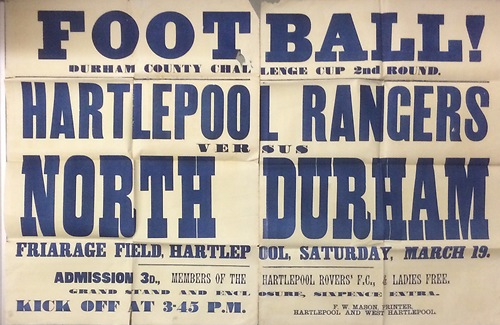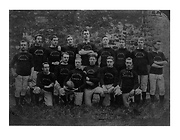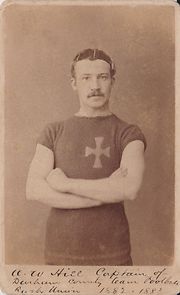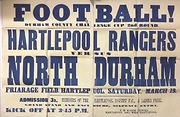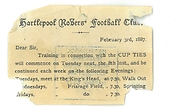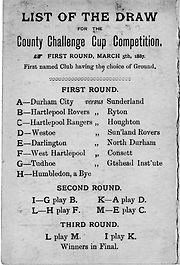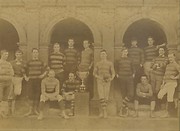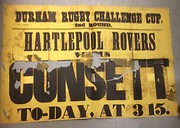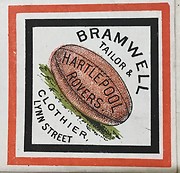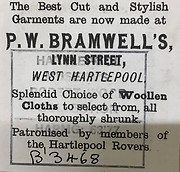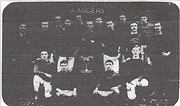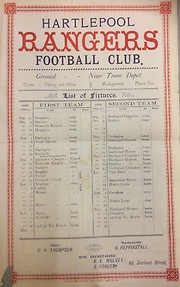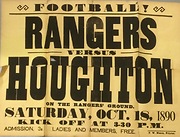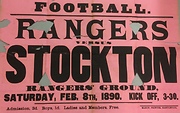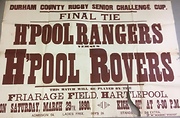 Hartlepool Sports & Leisure
Hartlepool Sports & Leisure
- Cinemas, Theatres & Dance Halls
- Musicians & Bands
- At the Seaside
- Parks & Gardens
- Caravans & Camping
- Sport
 Hartlepool Transport
Hartlepool Transport
- Airfields & Aircraft
- Railways
- Buses & Commercial Vehicles
- Cars & Motorbikes
- The Ferry
- Horse drawn vehicles
 A Potted History Of Hartlepool
A Potted History Of Hartlepool
- Unidentified images
- Sources of information
- Archaeology & Ancient History
- Local Government
- Printed Notices & Papers
- Aerial Photographs
- Events, Visitors & VIPs
 Hartlepool Trade & Industry
Hartlepool Trade & Industry
- Trade Fairs
- Local businesses
- Iron & Steel
- Shops & Shopping
- Fishing industry
- Farming & Rural Landscape
- Pubs, Clubs & Hotels
 Hartlepool Health & Education
Hartlepool Health & Education
- Schools & Colleges
- Hospitals & Workhouses
- Public Health & Utilities
- Ambulance Service
- Police Services
- Fire Services
 Hartlepool People
Hartlepool People
 Hartlepool Places
Hartlepool Places
 Hartlepool at War
Hartlepool at War
 Hartlepool Ships & Shipping
Hartlepool Ships & Shipping

1887 - Hartlepool Rangers v North Durham - On the Friarage field
What we know about this image :
The banner poster for the 2nd Round tie between Rangers and North Durham which tie had been frozen off at Gateshead a week earlier. The game was switched by the County to the Friarage Field (not Rangers ground!) Rovers were away at Tudhoe that day, so a game on the Friarage Field to attract the Rovers supporters who did not travel to the Tudhoe match, heavy snow had fallen again during the week, plus Rangers fans made for a bumper crowd.
This switch gave the County coffers as much needed boost as 2000 turned up to see Rangers account for the visitors and get to the semi-final stage against Humbledon.
However, the appearance of this poster in town was the cause of letters to the Press, pointing out that while “Rovers Members & Ladies” could enter free “the poor working lads who haven’t a cent” and support Rangers would have to pay!
Date (of image) : 19/3/1887
Donor : Harftlepool Museums Service
Creator : F W Mason
Part of the "Hartlepool Museums Service" collection
Location
Related items :
 1882 - 1894 - Hartlepool Rovers and the early days of the Senior Cup
1882 - 1894 - Hartlepool Rovers and the early days of the Senior Cup
Images from Rovers from before they took over Hartlepool FC in 1883 and their exploits in the Senior Cup. It is difficult for us today to imagine the effect the introduction of the Durham County Senior Competition in 1881 had on Rugby in the area.
Within a few short seasons of its introduction clubs had organised their teams more formally to ensure they won games and ideally the Cup. By 1885, Durham City, having defeated Boldon, Humbledon and North Durham, reached the Final against Sunderland Rovers. The game was played at the Friarage Field , here in Hartlepool, in front of a crowd of 9,000. The numbers swelled by train excursions from Sunderland, Shields, Newcastle, Darlington, Stockton and Middlesbrough to see City lift the Cup for the first time.
The Cup was not without its detractors and the Competition was withdrawn in 1886 but restored a year later when Rovers won for a second time (they had defeated North Durham in 1884) beating Humbledon in 1887.
The 1888 Final saw Durham City overcome Rovers on Ashbrooke before a crowd of 10,000 spectators, 1200 had arrived from Durham by a special train. A Darlington newspaper of that era reported “that the news of the defeat of Rovers was received in Hartlepool with dismay, the blinds were drawn, many places wearing an air of mourning, whilst one enthusiastic supporter of Rovers an outfitter at West Hartlepool, edged the telegram announcing the feat with a deep border of black”! The outfitter referred to was probably Bramwells of lynn Street and their Business card appears in this Gallery.
Rovers soon revived and went on to play in a great number of Finals, this early period being particularly successful featuring in eight of the Finals in the decade covered by this Gallery. The Robert Wood collection contains a number of posters advertising games in the Competition which was always held in March, a simpler and very successful format that was tried in recent times with success.
More detail » 1884 - 1892 - Hartlepool Rangers Football Club
1884 - 1892 - Hartlepool Rangers Football Club
Images of the Rangers Club that played for several years but neither photographs nor records of their exploits appear to have survived. Interviewed by the “Mail” in 1938, Mr. Henry Kaiser (of 60 Montague St) recalled he was a founder member, playing centre when a Rugby team used only 3 threequarters, before the four 3 three quarter system evolved. They were formed around 1883/4 just after the amalgamation of Rovers and Hartlepool, and played initially on a field where Montague Street now stands. Shortly after, they were at Hart Warren, on land later acquired for housing, (Near the Tram Depot) and though enjoying some success,including a player in the County XV, they folded in 1892 as their Hart Warren site had been taken over for housing.
They reached the Final of the 1890 Senior Cup losing to Rovers and then won the Second Teams Cup (in 1892). That year proved fatal for the Club for at the 1892 AGM the club ceased existence with the "shortage of a field" given as the reason and at the Annual Dinner held at the Fleece it was announced that the club would fold as the ground was needed for building sites! The dinner was a formal affair with speeches on aspects of Rugby & Commercial life and then Mr. Heppinstall, the Club Captain, was last to his feet to formally announce the end of the club.
Though the Hartlepool Rangers name fades from the records in the 1890s, an age grade club played under the Rangers name later in the decade, it came back to prominence when a Club also called Hartlepool Rangers was very prominent in Junior Club circles throughout the Edwardian period and achieved Senior Status for a season or so before disappearing in 1912.
More detail »





